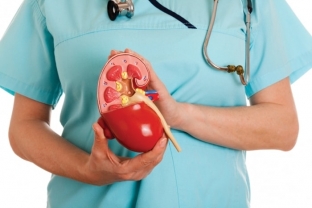Pyelonephritis or inflammation of the kidneys – quite a serious disease, and patients often mistake it for a type of cold.
But, if the disease is not fought or the treatment is not properly approached, then, being driven inside, it can lead to irreparable consequences, up to kidney failure, which poses a threat to life. Therefore, you should know the features and symptoms of this insidious disease. And, having discovered even its slightest signs, immediately consult a doctor for qualified help.
Features of the disease. What characterizes him
Pyelonephritis – This is an infectious disease characterized by the fact that inflammation extends both to the renal pelvis (it contributes to the excretion of urine) and to the kidney itself. A number of bacterial microorganisms can serve as the causative agent of the disease: streptococci, E. coli, etc.
Bacteria enter the filtering organs of the human body as follows:
- are carried by the bloodstream, then the inflammation flares up sharply, which leads to the development of acute pyelonephritis;
- but mostly disease-causing bacteria enter the kidneys through the urinary system.
The latter case is characterized by the development of a chronic form of kidney disease, which can be accompanied by constant infection and often go unnoticed. However, relapses, when signs of the disease do not yet appear, and the person feels normal, can suddenly be replaced by exacerbations. Basically, this happens in the spring-autumn period, when there is a decrease in immunity and an increase in colds due to the inconsistency of weather conditions. According to doctors, exacerbation of pyelonephritis, initially asymptomatic, later causes complications that are more difficult for the patient to endure.
If diagnosed with – chronic pyelonephritis, it must be borne in mind that its exacerbation can occur at any time, and preventive measures can not always help. Pyelonephritis has long been recognized as a rather complex kidney disease, and physicians have been studying it for thousands of years. Medicine, both folk and official, has extensive experience in dealing with this disease, but, unfortunately, it cannot be cured. Of course, it is possible to prevent the exacerbation of pyelonephritis, but it will not be possible to completely get rid of it.
Symptoms of an exacerbation of the disease. Methods for determining it
Recognizing an acute form of the disease is often difficult. Exacerbation of pyelonephritis is characterized by aching pain in the lower back, blanching of the skin, loss of appetite, headaches, subfebrile temperature, increased urination, and general weakness. Changes in blood pressure are not excluded, especially for hypertensive patients.
But exacerbations of chronic pyelonephritis may also have symptoms of an acute illness. First of all, it is a strong chill, increased sweating, unquenchable thirst, nausea, loss of appetite, and back pain. At the same time, body temperature can often change during the day: from a rapid increase to a sudden drop.
But, despite such a difference in the possible development of events, an exacerbation of pyelonephritis should be suspected of being unwell if the following symptoms are detected (even if they are not clearly expressed):
- general weakness;
- headaches;
- quick fatigue;
- subfebrile temperature;
- chills;
- frequent urination at night;
- dry mouth;
- heaviness in the lower back;
- slight swelling of the face, hands, legs and feet;
- high blood pressure.
But the symptoms of the disease will be more pronounced if both kidneys are affected, which can cause the patient to vomit frequently. This indicates that there was a malfunction in the functioning of these important organs due to poisoning with toxic nitrogenous compounds, the removal of which from the body is difficult.

Measures to prevent and treat exacerbations
Treatment of an exacerbation of the disease should first of all be aimed at eliminating the cause that prevents the normal drainage of urine from the organs affected by the disease. This is achieved by getting rid of stones in them, treating prostate adenoma, etc. In this case, you should act immediately in order to quickly get rid of the infection and normalize urine output.
Long-term antibacterial therapy will be required with the use of antibiotics and drugs that relieve inflammation and have a diuretic, vasodilating effect. During this period, it is very important to drink plenty of fluids to flush the kidneys.
Phytotherapy also plays an important role in this case. So, birch leaves, parsley, juniper are excellent diuretics, bearberry and lingonberry leaves have an anti-inflammatory effect, and chamomile and garlic – they are excellent natural antiseptics.






Add a comment